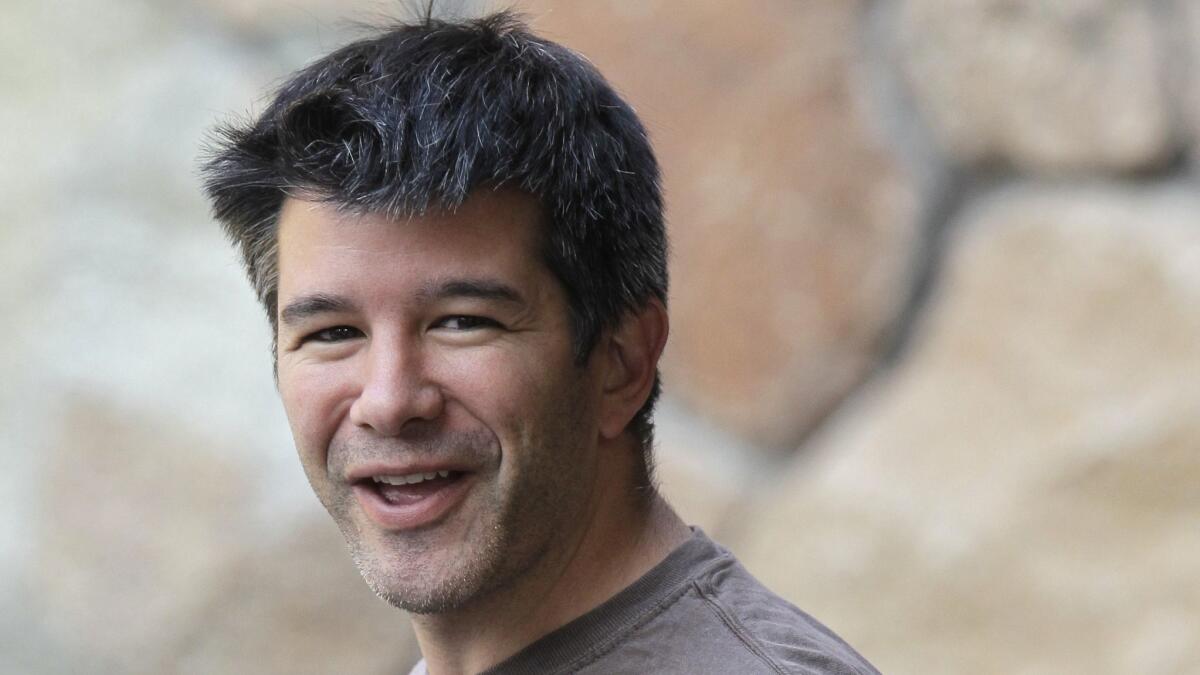Whatever happened to ousted Uber CEO Travis Kalanick?

- Share via
Travis Kalanick built Uber in his own image.
Under his leadership, the company smashed into markets, flouting local transportation rules, circumventing law enforcement and clashing with regulators as it grew into the world’s biggest ride-hailing business. His brash style was seen as the reason for Uber’s rise and his own undoing in 2017 when, after a series of scandals, Kalanick was forced to resign under pressure from investors.
Since Kalanick was pushed out, Uber has been working hard to tidy its reputation and appear more subdued and well-behaved. New CEO Dara Khosrowshahi has worked hard to move beyond Kalanick’s legacy, doing away with his predecessor’s 14 company tenets, replacing principles such as “super pumped” and “always be hustlin’” with credos such as “we do the right thing” and “we persevere.”
But as Uber prepares for its much-anticipated initial public offering, Kalanick isn’t out of the picture by any stretch.
He still sits on Uber’s board and holds an 8.6% stake in the company, accounting for about 117.5 million shares, according to the IPO filing. If the company debuts as expected with shares priced somewhere between $44 and $50, his holdings would amount to more than $5 billion.
Kalanick plans to be at the New York Stock Exchange on Friday when the company begins trading on public markets, but the co-founder won’t be on the balcony when Khosrowshahi rings the opening bell — he’ll be on the floor.
Kalanick wanted to be on the balcony with his father in tow when the bell was rung, according to the New York Times, but Khosrowshahi rejected his request. Khosrowshahi and others in the company reportedly considered Kalanick a liability and wanted to keep him at arm’s length. The company said the plan was always for drivers and early employees to stand with Khosrowshahi on the podium, according to The Times.
Both Uber and a spokesperson for Kalanick declined to comment, citing regulatory rules prohibiting promotional efforts ahead of an IPO.
Born and raised in Los Angeles, Kalanick dropped out of UCLA in 1998 to work full time on his start-up called Scour, which allowed people to virtually share music and media files. (The company was sued and eventually filed for bankruptcy.)
Kalanick founded Uber with his friend Garrett Camp and Ryan Graves (who got his job by tweeting at Kalanick) in San Francisco in 2009. At the time it was called UberCabs, but the company dropped “Cabs” from its name after receiving a cease-and-desist order from city authorities in 2010.
“We just wanted to push a button and get a ride,” he said at a Business Insider conference in 2013. “And we wanted to get a classy ride. We wanted to be baller in San Francisco. That’s all it was about.”
After his departure from Uber, Kalanick set up an investment fund and purchased for $150 million a controlling stake in the real estate company City Storage Systems, a move that made him the firm’s chief executive. Kalanick has worked quietly on one of its holdings, CloudKitchens, a Los Angeles-based venture that primarily focuses on kitchen rental services — like WeWork but for kitchen space.
CloudKitchens has been ramping up: It already works with brands in Los Angeles such as Sweetgreen and Canter’s Deli, and plans to open shop in San Francisco and Chicago, Bloomberg reports. In March 2018, when Kalanick tweeted about his investment fund, he said its overarching theme would be “large-scale job creation, with investments in real estate, e-commerce, and emerging innovation in China and India.” The South China Morning Post reported in February that Kalanick also plans to bring CloudKitchens to China.
CloudKitchens and Uber could compete, should Uber Eats make further inroads in the “virtual restaurant” business. But Khosrowshahi last year tweeted congratulations to Kalanick, calling CloudKitchens a “super-interesting partner of @UberEats.”







